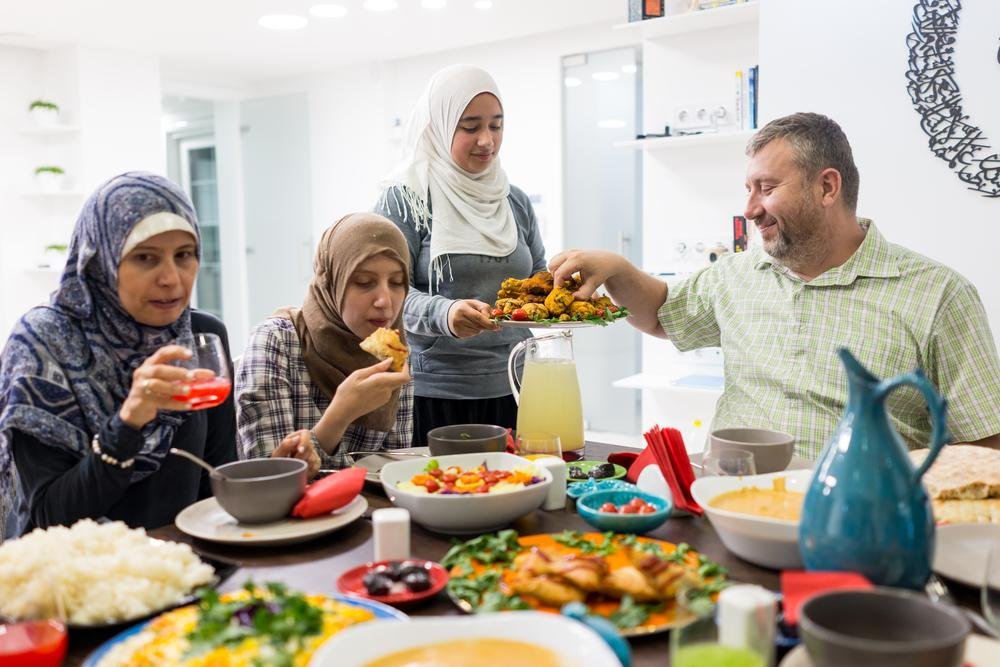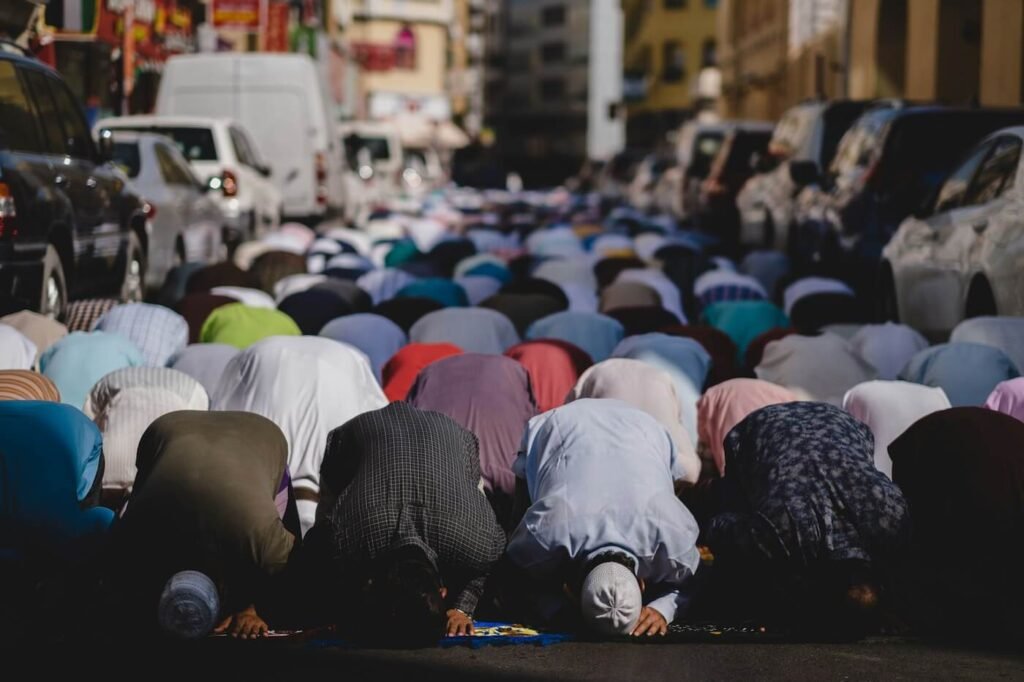In the UAE, Ramadan is more than just a religious observance. It is a time when communities come together in ways that transcend nationality, language, and tradition. In cities like Dubai, Abu Dhabi, Sharjah, and beyond, the spirit of Ramadan creates a beautiful tapestry of human connection — where locals and expats unite in prayer, generosity, and celebration. It is in this melting pot of culture and kindness that Ramadan in the Emirates truly comes alive.
Breaking Bread, Building Bridges
Every evening as the sun sets and the call to Maghrib prayer echoes through neighborhoods, Iftar becomes a shared ritual — a moment where hunger meets hospitality. Across the Emirates, you’ll find Emirati families opening their homes to neighbours from every corner of the globe, while large-scale community Iftars bring together thousands of people from different backgrounds.
In Sharjah, Lebanese expat Sara recalls the first time she was invited to an Emirati family’s home for Iftar. “There were dishes I’d never tried before — harees, thareed, dates stuffed with nuts — but the warmth I felt was familiar. We didn’t speak the same language fluently, but we understood each other perfectly.”

This welcoming spirit is felt in every emirate. From impromptu street-side Iftars organized by neighbours to more formal gatherings hosted in mosques, parks, and even office breakrooms, Ramadan in the UAE is defined by its inclusivity. It’s not just about food — it’s about forming bonds that outlast the season.
The Global Table
The UAE is home to over 200 nationalities, and that global diversity shows up in every Ramadan menu. Walk into a public Iftar or a multicultural restaurant during the holy month and you’ll be greeted by an international spread — Egyptian mahshi, Syrian fatteh, Indian pakoras, Nigerian jollof rice, Filipino lumpia, and more.
In Dubai’s more traditional districts, street vendors serve hot samosas and kunafa to passersby. Meanwhile, high-end hotels and restaurants host elaborate buffets that reflect the city’s international flair. But it’s in homes where the true culinary exchange happens — neighbours swapping dishes, sharing recipes, and discovering new flavours.
For Fatima, an Emirati mother in Al Ain, these food exchanges have become a cherished part of Ramadan. “My children look forward to trying new dishes each year. Last Ramadan, our neighbours from Bangladesh gave us shorbot and jilapi. Now my kids ask for it every Suhoor.”
Food becomes more than sustenance — it becomes storytelling. Each dish, each bite, is a memory shared and a culture celebrated.
Generosity Without Borders
Charity is a central pillar of Ramadan, and in the UAE, that value manifests in countless ways. Throughout the month, you’ll find residents from all walks of life coming together to support others — distributing Iftar meals, organizing donation drives, refilling community fridges, or simply offering a kind word to someone fasting.
In Ajman, a group of university students initiated a daily Ramadan fridge project. Every evening, they refilled the fridge outside their apartment building with essentials — water, yogurt, fruits, and snacks. They never saw who took the items, but that was the point. As one of them put it, “Giving anonymously feels more sincere. Ramadan teaches us that.”
Labour camps across the country often receive meals donated by local families, schools, or volunteer groups. Even children get involved — drawing cards, packing boxes, and learning that giving isn’t about how much you have but how much you’re willing to share.
And it’s not just Muslims participating. Many non-Muslims living in the UAE join these efforts, viewing Ramadan as an opportunity to contribute to a larger sense of community and compassion.
Understanding Through Experience
Ramadan in the UAE is also a lesson in cultural exchange. For many non-Muslim expats, it becomes a time of learning, reflection, and even participation. Some choose to fast for a day or two in solidarity with Muslim friends or colleagues. Others attend Iftar events to experience the spiritual atmosphere firsthand.
Michael, a British teacher in Ras Al Khaimah, has been fasting during Ramadan for the past three years — not out of religious obligation, but to better understand his students and immerse himself in local culture. “At first it was hard, but now it’s something I look forward to. It’s a reset, mentally and emotionally. It brings me closer to my students and their families.”
Workplaces and schools often host Ramadan awareness sessions, encouraging everyone to respect and engage with the traditions of the month. Children, especially those in international schools, grow up learning not just about fasting and prayer, but about kindness, patience, and empathy — values that resonate across all faiths.
Celebrations Beyond Sunset
Once the sun sets and prayers are completed, the UAE transforms into a glowing, joyful space filled with activity. Ramadan nights are known for their vibrancy — bustling night markets, family outings, and special events that continue late into the night.
In Abu Dhabi, Ramadan tents are set up where people of all backgrounds gather to enjoy Suhoor, play traditional board games, and listen to live music. In Dubai, cultural festivals offer storytelling sessions, art exhibits, and heritage showcases that attract both locals and tourists.
Children play in open courtyards, lanterns light the streets, and coffee shops stay open until dawn. It’s a time when the rhythm of life shifts — slower during the day, livelier at night — and everyone, regardless of background, is welcome to join the celebration.
Faith, Family, and Friendship
What makes Ramadan in the UAE truly unique is how it evolves year after year while staying rooted in tradition. The sense of community it fosters leaves a lasting impression not only on those who observe it religiously, but also on those who experience it culturally.
Friendships deepen, families grow closer, and strangers become neighbours. People remember how they were invited, included, and embraced — even if only for a meal, a prayer, or a smile.

For Noor, a Syrian graphic designer in Dubai, this sense of unity is what she cherishes most. “During Ramadan, I see the best of humanity. We forget where we’re from and just connect as people. That’s the UAE I love — one that brings everyone together.”
A Shared Spirit
In a country known for its skyscrapers and innovation, Ramadan brings focus back to something timeless — human connection. As expats and locals fast, feast, and reflect together, they form a deeper understanding of each other’s stories, values, and hopes.
This is the beauty of a multicultural Ramadan in the UAE: it is not just an act of worship, but a celebration of diversity, unity, and shared humanity.
And when the month ends and Eid arrives, the memories linger — in laughter, in lessons learned, and in the relationships built under the crescent moon.
Would you like me to help you turn this into a print-ready PDF or support you with social media captions?
Read More: Green Mosques: How UAE Is Building Sustainable Places of Worship













